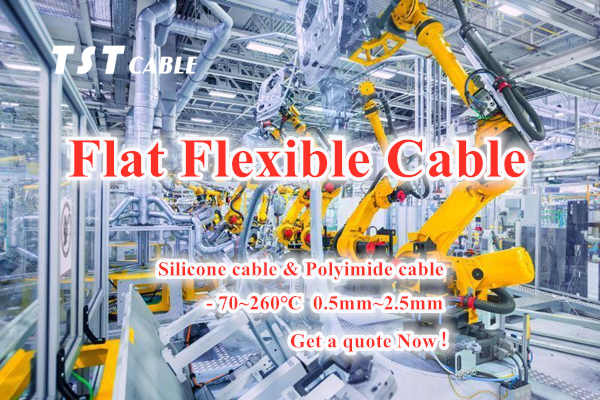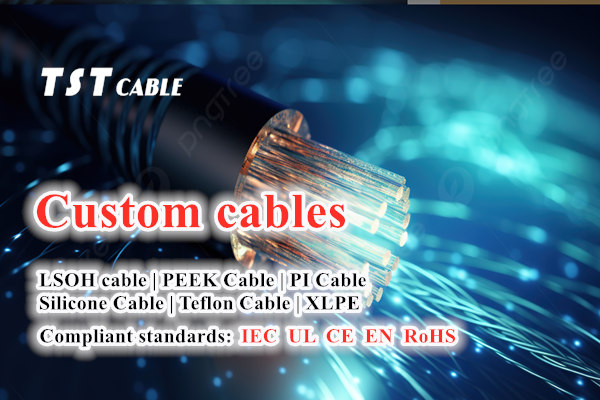
Flexible cable is a wire connection device with good bendability and flexibility. It usually consists of multiple strands of tiny wires encased in a protective material to enhance its flexibility and tensile strength. Compared with traditional rigid wires, flexible cables have greater bendability and toughness, and can adapt to the zigzag shapes and movement needs in different scenarios.
The characteristics of flexible cables mainly include:
Flexible appearance: Flexible cables can be more freely deformed and bent, with a smaller bending radius and greater freedom of curvature.
Excellent electrical properties: Flexible cables have high conductivity and interference immunity, as well as low return loss and stable induced electromotive force.
Good mechanical properties: flexible cables have good tensile strength and tear resistance, and can withstand a certain degree of twisting, flexing and other mechanical forces.
Adapt to a wide range of environments: Flexible cables can cope with extreme environmental requirements such as high and low temperatures, humidity, corrosion and vibration on different occasions.
Flexible cables are mainly divided into sensor/encoder cables, servo motor cables, robot cables, cleaning cables and drag chain cables according to their functions. These different types of flexible cables play an important role in their respective fields of application.
Application areas of flexible cables:
Flexible cables are widely used in a number of fields, such as petrochemical and natural gas, electronic equipment manufacturing (including cell phones, tablet computers, etc.), machinery and equipment, aerospace, medical equipment manufacturing, communications field, and marine and offshore engineering. With the continuous progress and innovation of science and technology, the application fields of flexible cable will be further expanded, bringing more convenience and benefits to all walks of life.
Flexible cables are widely used in many fields due to their good flexibility and bendability.
- Industrial automation: In the field of industrial automation, flexible cables are widely used in robots, sensors, servo systems and other equipment. As these devices need to move and bend frequently, flexible cables can provide stable power and data transmission to ensure the normal operation of the equipment.
- Medical equipment: In medical equipment, flexible cables are commonly used to connect various sensors, monitoring instruments and mobile devices. Flexible cables meet the high reliability and precision requirements of medical equipment and remain stable during frequent movement and operation of medical equipment.
- Aerospace: The aerospace field has high requirements for cables with high temperature resistance, cold resistance, oil resistance, corrosion resistance and other characteristics. Flexible cables are able to adapt to extreme temperatures and environmental conditions due to their special materials and structural design, ensuring stable signal transmission.
- Transportation: In the field of transportation, such as automobiles, trains, ships, etc., flexible cables are used for the connection of various sensors, control systems and communication devices. They are able to withstand vibration and shock during vehicle movement and maintain the stability of power and data transmission.
- New energy and environmental protection: In solar and wind power generation systems, flexible cables are used to connect solar panels, wind turbines and energy storage devices. In addition, flexible cables play an important role in electric vehicle charging facilities.
- Military and Defense: In the military and defense fields, flexible cables are favored for their high reliability, resistance to harsh environments and anti-interference capabilities. They are widely used in communication equipment, navigation systems and weaponry.
- Consumer Electronics and Home Appliances: With the rise of smart homes and wearable devices, flexible cables are increasingly used in consumer electronics and home appliances. For example, in products such as smartwatches, headphones, and smart home devices, flexible cables provide stable connections to internal components.
Difference between flexible and rigid cables:
Appearance and Structure:
Flexible cables have a soft appearance and bendable structure, consisting of multiple strands of tiny wires wrapped in a protective material that is easy to bend and deform.
Rigid cable is relatively hard, not easy to bend, its internal structure is usually more fixed.
Electrical and mechanical properties:
Flexible cables have excellent electrical and mechanical properties, including high conductivity, anti-interference ability, and good tensile strength and tear resistance.
Rigid cables may not perform as well as flexible cables in these areas, especially in applications that require frequent bending or movement.
Application scenarios and adaptability:
Flexible cables, because of their flexibility and bendability, are widely used in applications requiring flexible wiring, such as robotics, servo systems, traction systems and other special environments, and can adapt to extreme environmental requirements such as high and low temperatures, humidity, corrosion and vibration.
Rigid cables are more suitable for fixed wiring and do not require frequent bending or moving occasions.
Cost:
Flexible cable is relatively expensive to manufacture because it requires the use of more materials and more complex techniques to manufacture.
Rigid cables are less expensive because they are made with simpler materials and manufacturing processes.
TSTCABLES’ high-quality flexible cables, with their excellent flexibility and bendability, are perfectly adapted to a variety of complex environments, ensuring the stable transmission of power and data. Whether you are in the field of industrial automation, medical equipment, or new energy, our flexible cables will be your right-hand man on the road. Looking to the future, with the rapid development of science and technology, TSTCABLES flexible cables will become a key link to connect smart devices, helping you to easily ride the wave of global intelligence. If you have questions and customization needs for flexible cables, please feel free to email us. Choosing TSTCABLES is choosing a more leading, intelligent, efficient and reliable future.
Also available in:
English




